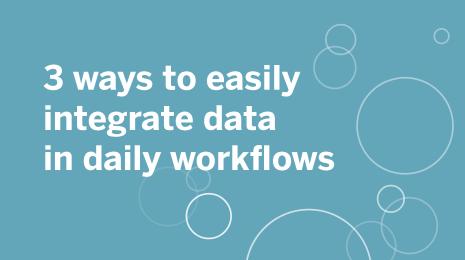In Times Of Great Change, Turn To Data
Editor's note: This article originally appeared in Forbes.
Until last February, many organizations were enjoying reliable, scalable business models and a good economy. Then Covid-19 hit, and many suddenly found that their existing business models were struggling to rapidly adapt as we ushered in a "new normal." They were back to square one — figuring out what works in an uncertain and unknown market, especially if they had to shift in-person experiences to the digital realm.
The pandemic also accelerated the imperative to use that data generated by this new influx of digital information. Early in the pandemic, McKinsey & Company reported that we'd "vaulted five years forward in consumer and business digital adoption in a matter of around eight weeks." That rate won't slow anytime soon. It also reported that 75% of people using digital channels for the first time indicated they'd continue to do so when life returns to "normal."
These sudden changes meant that organizations had to rely on the data these digital processes generated to understand their businesses and make better decisions in the face of this quickly changing world. Taking weeks, or even days, to make a decision was no longer viable while navigating a pandemic.
At Tableau, we know that data can make a tremendous difference in how well an organization performs, but never before has it been more essential in making decisions fast and moving forward. Here are the key reasons why data will help you come out ahead in this crisis and beyond based on our data culture research and conversations with thought leaders.
Data Is An Equalizer And Source Of Truth
One of our biggest findings when researching what makes a strong data culture is that decisions are always based on data, not rank or opinion.
This means that organizations that use data are more egalitarian, as data gives everyone the confidence to start conversations and participate in decision-making with data. Decisions are not based on opinions, anecdotal evidence or directives that come from higher offices; everything is backed by concrete data that everyone can easily use to share information and align on a direction.
When data is central to decision-making, systems and processes are in place to use data to prove or disprove ideas. This tracking and testing model based on data also means that organizations can implement new processes or changes faster. Data-driven decisions are so essential that McKinsey also cited them as one of the most important elements organizations need to be successful moving forward.
Data Enhances Creativity
Many might think that data is the enemy of creativity, but it's the organizations using data in tandem with creative processes that are driving innovation today. The most successful ones integrate data and creativity at the start of any project.
Well-designed tests can try several competing ideas at once. Good data collection and analysis can suggest other ideas to try next. By eliminating unsuccessful ideas through good data-based testing, intuition or ideas can more quickly become reality. No one argues about whether an idea is good or not because the data reveals it. Organizations can then roll out a product or service in a shorter time frame, gaining a significant advantage over the competition.
Data Helps Navigate Uncertainty And Change
Today, there is so much upheaval that even with the best people, products and ideas, an organization likely won't survive without using its data. Organizations are being pushed to try new ideas and adapt quickly as an uncertain environment changes around them. While trying new ideas, testing and pivoting fast is an almost daily practice for startups, this pandemic has forced even large, stable enterprises to reinvent how they do things.
Data can allow organizations of any size to move faster and better navigate during uncertain times. An organization's leaders can map out a strategy based on facts, not guesswork, empowering them to make more confident, informed decisions. How quickly organizations use data to make adjustments can help determine who emerges as a leader in their industry.
Data Is The Way Forward
In a year when making decisions based on data has become more imperative than ever, it's never been more important to foster a data-literate workforce. This means investing in data-literacy programs and showing people how to use data. It's ensuring you have the right governance and guardrails in place to make sure your data is trustworthy and used appropriately and committing to everyone in the organization, basing all conversations on data.
Several months into the pandemic, McKinsey reported that analytics will help fuel resiliency and the return for global organizations but that many still face "common obstacles" when it comes to adopting an analytics program. In fact, it found that "fewer than 20% have all of the necessary building blocks" to even establish one. The good news is that it also found that any organization is capable of starting a "rapid analytics approach in as little as eight weeks."
It doesn't happen overnight, but the organizations leading the way out of this pandemic will very likely be the ones using data. Making data use a consistent practice across your entire organization takes a strong commitment and dedicated daily practice. However, with data driving innovation at the heart of any strategy, these leaders should be better equipped to adapt and change quickly knowing that data is backing their every move.
Zugehörige Storys
Blog abonnieren
Rufen Sie die neuesten Tableau-Updates in Ihrem Posteingang ab.







